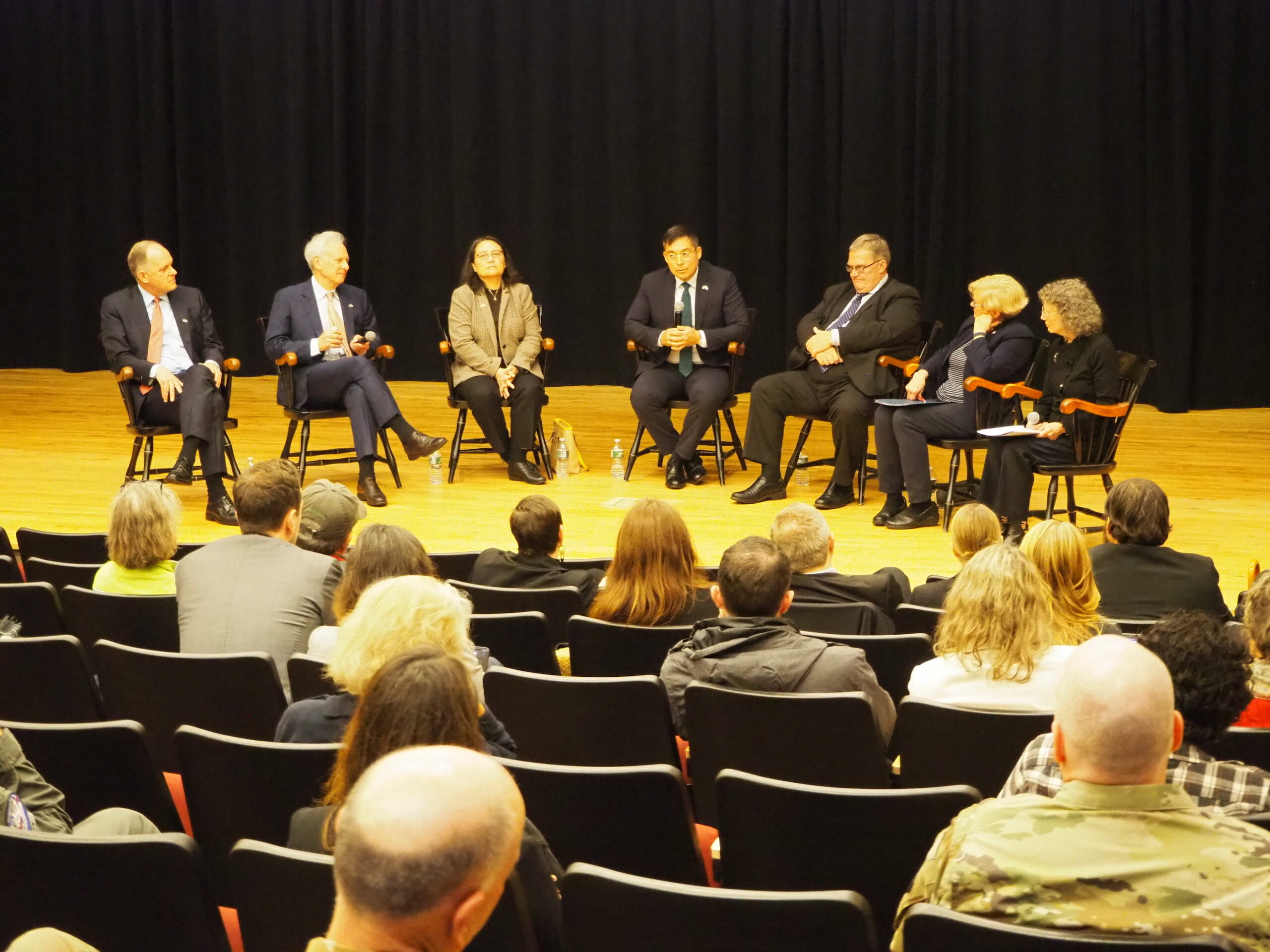US-Greenland Joint Committee discusses arctic affairs on campus
October 21, 2022

On Tuesday, the College hosted a meeting of the U.S.-Greenland Joint Committee, an intergovernmental body that meets annually to bolster ties between the United States and Greenland.
According to a press release from the U.S. Embassy and Consulate in the Kingdom of Denmark, the Joint Committee strives to improve relations and cooperation between the United States and Greenland in the areas of trade, investment and education, among others. At the meeting’s conclusion, representatives signed an agreement committing to strive for development in each of these categories.
This year’s Joint Committee meeting was led by the Greenlandic Permanent Secretary for Foreign Affairs, Business and Trade Mininnguaq Kleist, U.S. Ambassador to the Kingdom of Denmark Alan B. Leventhal and U.S. Deputy Assistant Secretary of State for European and Eurasian Affairs Douglas Jones ’89.
Following the closed-door meeting, members of the Joint Committee hosted an off-the-record Q&A session in Kresge Auditorium alongside Rep. Chellie Pingree (D-ME) and Professor of Anthropology, Chair of Department of Anthropology and Director of Peary-MacMillan Arctic Museum and Arctic Studies Center Susan Kaplan. The Q&A was attended by members of the Bowdoin community, students at the University of Greenland and the general public.
Over the past several years, Maine government officials have worked to position the state as a prominent actor in Arctic affairs. In 2015, Sen. Angus King (I-ME) became co-chair of the Senate Arctic Caucus, and in 2019, Governor Janet Mills worked alongside the governments of Finland and Norway to negotiate memoranda of understanding confronting climate change.
According to Kaplan, Maine’s emergence into the sphere of Arctic interests made Brunswick an ideal location for the U.S.-Greenland Joint Committee’s proceedings.
“Maine has been increasingly active in Arctic issues … [and] has been actively engaged in increasing trade [with] the Nordic countries,” Kaplan explained. “Senator King has called Maine, behind Alaska, the second Arctic state … and so it seemed logical for [the U.S.-Greenland Joint Committee] to come to Maine.”
The U.S.-Greenland Joint Committee meeting is a continuation of a storied history of collaboration among the Arctic States, which include Canada, the Kingdom of Denmark, Finland and the United States, among others. In 1996, these states joined forces to create the Arctic Council, an intergovernmental body dedicated to confronting pressing issues in the Arctic region with emphasis on Indigenous and environmental causes.
The leadership rotation of the Arctic Council has designated the Russian Federation as council chair from 2021–2023, a distinction complicated and obscured by Russia’s invasion of Ukraine earlier this year. In March, the governments of Canada, the Kingdom of Denmark, Finland, Iceland, Norway, Sweden and the United States issued a joint statement suspending activity of the Arctic Council in the wake of Russian aggression.
While not a direct subsidiary of the Arctic Council, the U.S.-Greenland Joint Committee meeting provided a crucial opportunity for conversation among Arctic States despite the Council’s hiatus. Professor of Government and Acting Russian Department Chair Laura Henry is relieved to see an effort to preserve Arctic cooperation despite the challenges posed by the war in Ukraine.
“This is an urgent time for the Arctic,” Henry wrote in an email to the Orient. “Since Russia’s war in Ukraine has disrupted the usual channels of cooperation, Arctic states need to be innovative and adaptable to continue Arctic research and governance. In the case of Tuesday’s event, it is encouraging to see Greenland emerge as a more autonomous actor in the Arctic region that is able to decide whether and how its natural resources are used.”
Kaplan echoed this sentiment.
“I don’t think anybody could ignore the fact that [this Joint Committee meeting] is happening in the shadow of this tumultuous political time,” Kaplan said.
As for why collaboration between the United States and Greenland is so important, especially in the context of Arctic affairs, Kaplan reached back to the United States’ establishment of Greenlandic air bases during the Cold War to emphasize the geographical advantage of an alliance. Kaplan also touched on the abundant opportunities for trade presented by Greenland’s array of natural resources.
“The eastern part of the United States is sharing an ocean with Greenland and the Nordic countries in Europe,” Kaplan said. “And so the North Atlantic is an area that both needs protection and has opportunity … that, through international agreements, you can more responsibly manage.”
Kaplan’s hope is that the United States and Greenland’s efforts will yield progress and continued cooperation, both politically and in her own field of Arctic studies.
“The hope is that whatever the [Joint Committee’s] mutual agreements are can be operationalized on the ground by people who are going to be researchers and students and business people,” Kaplan said. “So much of the research in the Arctic is collaborative, and so ensuring cross-border collaborations, both in education and research, [is] only going to enhance the quality of the work that all of us do.”

Comments
Before submitting a comment, please review our comment policy. Some key points from the policy: